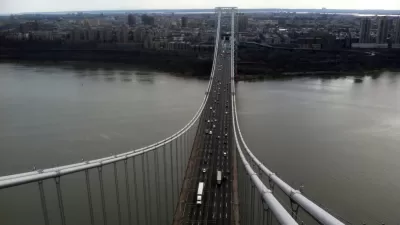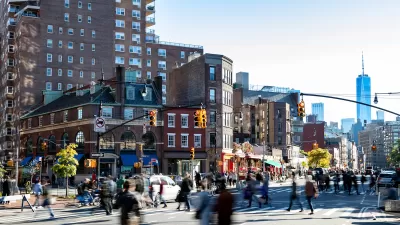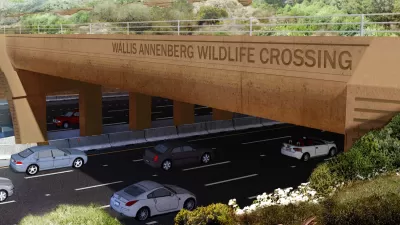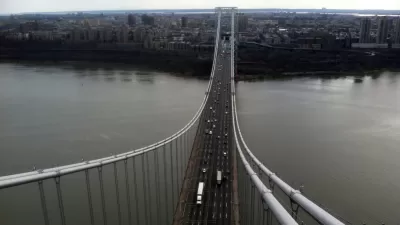In The New York Times Sunday Review, Matt Katz, a political reporter for WNYC and New Jersey Public Radio, gives an update on the federal trial for 'Bridgegate' and also paints a bleak picture for New Jersey, and maybe the United States.

Bridgegate, aka the George Washington Bridge lane closure scandal, began on September 9, 2013, with the closure of access lanes off the busiest bridge in the United States to Fort Lee, N.J. Initially Gov. Chris Christie's staff and his appointees to the Port Authority of New York and New Jersey claimed it was part of a traffic study, but an alternative explanation was offered by the infamous email, "time for some traffic problems in Fort Lee."
The reason for the lane closures has been shown to be political retribution against the Democratic mayor of Fort Lee, Mark Sokolich, for not endorsing the Republican governor in his 2013 reelection to a second term.
A lengthy investigation by the state legislature and the Port Authority ensued, but it is the federal investigation that began in January 2014 by the United States Attorney for the District of New Jersey (U.S. Department of Justice), Paul J. Fishman, ironically Christie's former position before running for governor, that is now the center of attention.
To be sure, Christie is not being charged by Fishman's office. But his claims that he was unaware of the lane closures have been disputed by witnesses.
Christie left the U.S. Attorney's office in 2008 and ran for governor of New Jersey the next year, "vowing to clean up the state," writes Katz.
But over the past two weeks, a federal corruption trial in Newark has made it disappointingly clear that the governor failed. As it has turned out, Mr. Christie, who is now running Donald J. Trump’s transition team to fill top jobs should Mr. Trump win the White House, ended up tarnishing his own administration.
The trial has put into stark relief the corruption that seems rife in New Jersey politics. If the lawman Chris Christie couldn’t fix it — if he could, in fact, turn government into a taxpayer-funded organ of his political ambitions — then who’s to save the Garden State?
Damage goes beyond the Garden State
He’ll leave behind a deeply wounded Port Authority, with higher tolls and decaying infrastructure. Mr. Christie and Gov. Andrew M. Cuomo of New York jointly vetoed bills to reform the agency, so the potential remains for it to continue to be co-opted by the political and personal interests of wealthy insiders like David Samson, the former Port Authority chairman and state attorney general [who pleaded guilty to bribery charges], and a father figure to Mr. Christie.
National implications?
In addition to heading Trump's transition team should Trump become president, Katz writes that Trump has already hired "two former Christie aides who were deeply involved in [Christie's reelection] endorsement courtships."
Katz warns, "New Jersey-style politics may soon go national."
More on Katz:
Matt Katz is the author of “American Governor: Chris Christie’s Bridge to Redemption."
In 2015 Matt and a team from WNYC won a Peabody Award for their coverage of Christie and the Bridgegate scandal. The series -- "Chris Christie, White House Ambitions and the Abuse of Power" -- was WNYC's first Peabody for news coverage since 1944, when the station won for Mayor Fiorello LaGuardia's weekly addresses to New York City.
FULL STORY: Corruption in the Soprano State

Pennsylvania Mall Conversion Bill Passes House
If passed, the bill would promote the adaptive reuse of defunct commercial buildings.

Planning for Accessibility: Proximity is More Important than Mobility
Accessibility-based planning minimizes the distance that people must travel to reach desired services and activities. Measured this way, increased density can provide more total benefits than increased speeds.

World's Largest Wildlife Overpass In the Works in Los Angeles County
Caltrans will soon close half of the 101 Freeway in order to continue construction of the Wallis Annenberg Wildlife Crossing near Agoura Hills in Los Angeles County.

Eviction Looms for Low-Income Tenants as Rent Debt Rises
Nonprofit housing operators across the country face almost $10 billion in rent debt.

Brightline West Breaks Ground
The high-speed rail line will link Las Vegas and the Los Angeles area.

Colorado Bans No-Fault Evictions
In most cases, landlords must provide a just cause for evicting tenants.
City of Costa Mesa
Licking County
Barrett Planning Group LLC
HUD's Office of Policy Development and Research
Mpact Transit + Community
HUD's Office of Policy Development and Research
Tufts University, Department of Urban and Environmental Policy & Planning
City of Universal City TX
ULI Northwest Arkansas
Urban Design for Planners 1: Software Tools
This six-course series explores essential urban design concepts using open source software and equips planners with the tools they need to participate fully in the urban design process.
Planning for Universal Design
Learn the tools for implementing Universal Design in planning regulations.
























